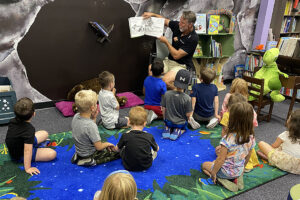Jessica is the co-director of Early Childhood Education at FRCS and, along with Margie Erbeck, will be taking over for Mr. Ron when he retires at the end of this school year.
Cultivating the Fruit of the Spirit…Early Childhood Edition
When people discover my profession, they often remark on the need for patience. While working with young children, patience is indeed useful. However, teaching patience requires different strategies.
So, what does it mean to cultivate the fruit of the Spirit in the lives of young children?
Love is the cornerstone of our faith and an attribute that makes children feel secure and cherished. Simple acts like a cuddle, words of affirmation, and quality time demonstrate God’s unconditional love. When we model love, we teach others that God loves them.
Children are naturally full of Joy, delighting in small things such as a silly song, sounds of laughter, or the feeling of wet paint between their fingers. We can help them see joy as a gift from God, pointing out His creations all around them.
In a world that is often chaotic, teaching children about God’s Peace can be a gift that lasts a lifetime. Utilizing moments of conflict, like peer quarrels, can help to introduce the idea of making peace. Additionally, teaching young children to pray can help them realize they can bring their worries to God, who is always there to listen.
Patience is not easy for little ones who want everything right now. However, learning to wait is an essential life skill and virtue. Using opportunities like waiting for their turn on the playground is an excellent way to practice patience. Sharing Bible stories, like Noah waiting for the flood to end is a way to tie in God’s perfect timing.
Children have an inherent capacity for empathy, which can be nurtured by educating them in practices of kindness. Making a card for someone sad, helping a friend clean up, or giving hugs are ways to show kindness. When we celebrate their acts of kindness, it reinforces just how important it is.
Children learn what is good by our example. When we choose to be honest, generous and compassionate we reflect God’s goodness to them. We can help young children understand goodness through simple actions, like donating toys, saying thank you, or even picking up trash. Teaching them that every good thing we do glorifies God and honors Him.
Faithfulness begins by learning to trust, first in their parents and caregivers, and eventually in God. By teaching children to pray, we build their understanding of God’s constant presence in their lives.
Teaching children gentleness shows them how to care in our words and actions. Guide children gently when they play with friends, help with chores, or handle pets to reinforce gentleness. Remind children that Jesus was gentle, yet strong, and gentleness is a way to show His love to others.
Self-control is a concept that may be complex for young children to understand, but it can be introduced in simple ways. Teaching them to pause and think before acting, whether it is sharing a toy or calming down when upset. Help them to understand that self-control honors God.
As we teach young children about the fruit of the Spirit, we’re not just helping them grow into kind and loving individuals. We are guiding them toward a deeper understanding of God’s character and His plan for their lives.
These early years are precious times to model, teach and nurture faith. Just as a gardener tends to a growing plant, we can cultivate this spiritual fruit in our children, trusting God will make them flourish in His perfect timing.







Leave a Reply